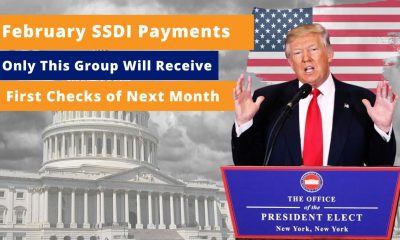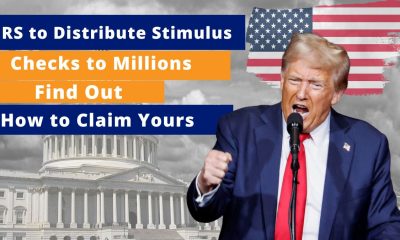Finance
Tax Season Is Here- Find Out When You Can Expect Your Refund

Tax season is here, and the IRS is anticipating that 140 million individuals will file their tax returns by the April 15 deadline.
To make the process more accessible, the IRS has introduced a new online tool designed to help taxpayers track the status of their refunds.
Federal Buyout Proposal May Impact IRS Staffing
In an attempt to reduce the size of the federal workforce, President Donald Trump has offered a buyout package to federal employees, including those working at the IRS.
Although the potential effect on IRS staffing during this crucial period is uncertain, this move could have implications for the agency’s operations. The IRS has not yet provided comments on the situation.
Refunds: What You Need to Know
When Can I Expect My Refund?
If you file your tax return electronically, the IRS expects that your refund will be issued in 21 days or less. Direct deposit will speed up the process, meaning you may receive your refund even quicker.
On the other hand, paper returns can delay your refund, potentially taking four weeks or longer. If your return requires corrections or amendments, it may take additional time.
The IRS advises taxpayers to refrain from depending on receiving their refund by a specific date, especially when planning significant purchases or bill payments.
How to Check the Status of Your Refund?
To check the status of your refund, use the IRS’s online tool, “Where’s My Refund?” This tool is available for use within 24 hours after electronically filing your return or within four weeks of filing a paper return.
The refund status is updated once daily, usually overnight. To check your refund status, you’ll need:
- Your Social Security or Individual Taxpayer Identification Number (ITIN)
- Your filing status
- The refund amount as calculated on your return
How Refunds Work
If you paid more taxes throughout the year than you owe—whether due to withholding or other reasons—you will receive a refund.
However, even if you did not overpay, you might still qualify for a refund if you are eligible for refundable credits such as the Earned Income Tax Credit (EITC) or the Child Tax Credit. Remember, to receive your refund, you must file your tax return. You have up to three years to claim a tax refund.
Do I Qualify for the Earned Income Tax Credit (EITC)?
Eligibility for the EITC depends on your income and investment earnings. If your investment income is below $11,600 and you meet the income limits for working, you may qualify. Here are the basic income thresholds:
- For a single filer with no children, your income must be $18,591 or less.
- For married couples filing jointly with three or more children, your income must not exceed $66,819.
To determine if you qualify based on your filing status and number of dependents, you can use the EITC Assistant tool available online.
What About the Child Tax Credit?
Most parents are eligible for the Child Tax Credit. This credit provides up to $2,000 per qualifying child. To qualify:
- The child must have a Social Security number.
- The child must be under age 17 by the end of 2024.
- The child must be claimed as a dependent on your tax return.
If you meet all the requirements and your annual income does not exceed $200,000 ($400,000 for joint filers), you qualify for the full amount.
Changes to Tax Filing This Year
This year, the IRS has expanded its Direct File program, allowing taxpayers in 25 states to file their taxes directly with the agency for free, up from just 12 states last year.
This service allows individuals with simple W-2 forms to file their returns without the need for commercial tax preparation software.
The IRS reports that participants in the 2024 pilot program claimed over $90 million in refunds.
FAQs
How long does it take to get a tax refund?
Refunds are typically processed in 21 days or less for electronic filings, and up to 4 weeks for paper filings.
Can I check the status of my refund?
Yes, use the “Where’s My Refund?” tool on the IRS website to track the status of your refund.
What is the Earned Income Tax Credit (EITC)?
The EITC is a refundable credit aimed at helping low to moderate-income workers, especially those with children.
-

 Government Aid3 months ago
Government Aid3 months agoFebruary SSDI Payments: Only This Group Will Receive the First Checks of Next Month
-

 Finance2 months ago
Finance2 months agoRare Bicentennial Quarter Worth $15 Million
-

 Government Aid2 months ago
Government Aid2 months agoSocial Security Announces 2025 Check Increase, But a 23% Reduction is Expected Soon
-

 Finance3 months ago
Finance3 months agoThe Lincoln Wheat Penny Worth $5 Million- Still Circulating Today
-

 Finance3 months ago
Finance3 months agoRare Coins: The 1964 D Lincoln Penny Errors You Should Know About
-

 Government Aid2 months ago
Government Aid2 months agoIRS to Distribute Stimulus Checks to Millions- Find Out How to Claim Yours
-

 Finance3 months ago
Finance3 months ago1970-D Kennedy Half Dollar- A Rare Coin Worth Over $150,000 Still in Circulation!
-

 Government Aid3 months ago
Government Aid3 months agoThe Complete February SSDI Payment Schedule: Discover When You’ll Receive Your Disability Benefits









